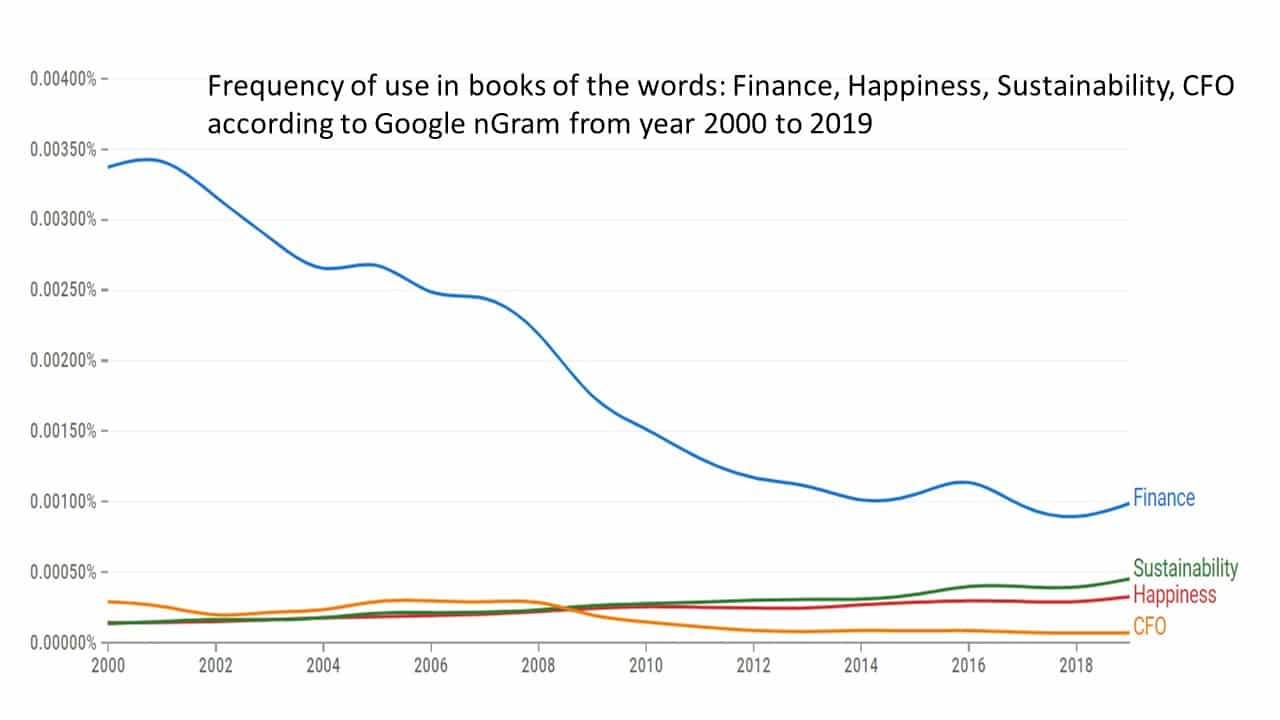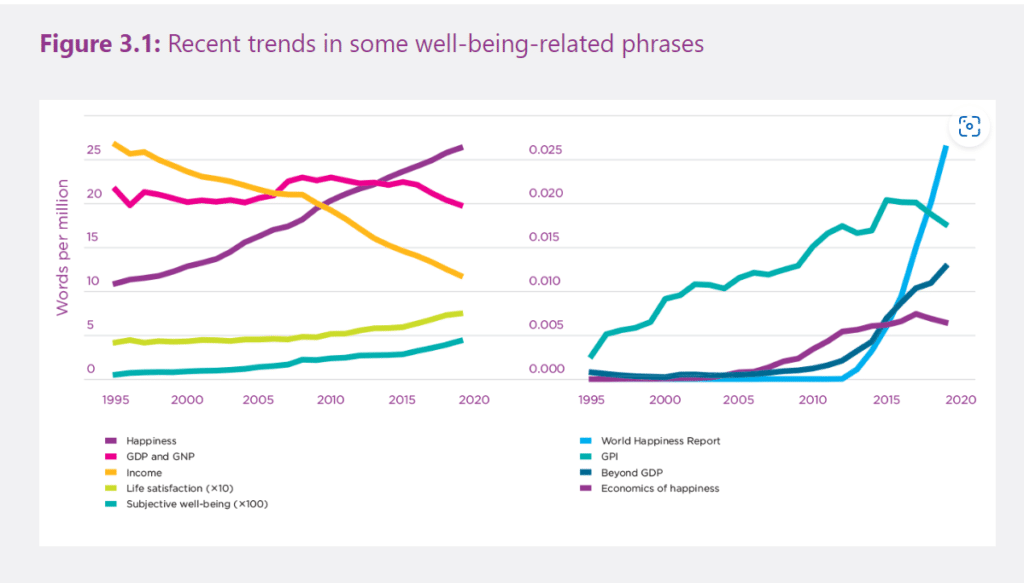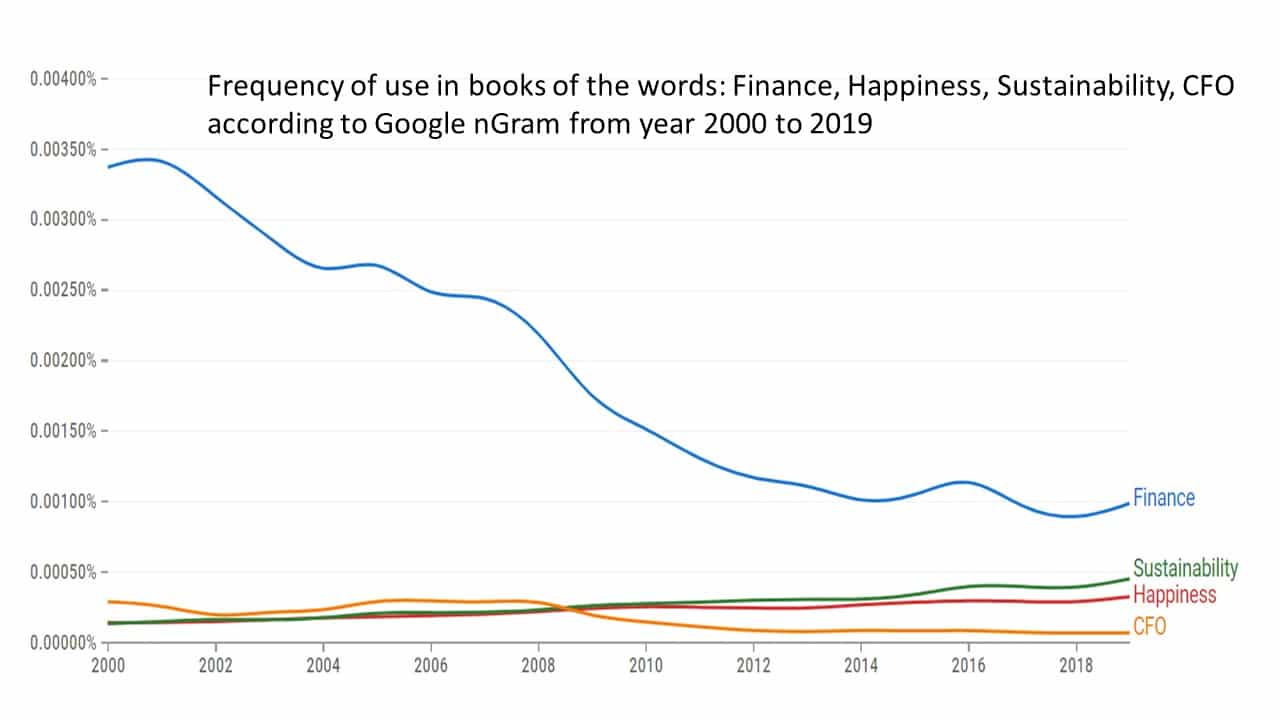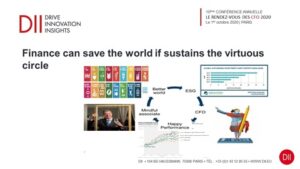Is Happiness taking over Finance in the common language?

In a few hours, the International Day of Happiness will draw attention and debate on it .
While waiting for the results to be published and understand how pandemic and geopolitical situation have impacted on happiness level, I tried to understand if the world citizens are increasingly giving space to the use of the words Finance, Happiness and Sustainability and CFO in books and the common language
Happiness, GDP and Income
I went back to the the 2022 edition of the World Happiness Report and took inspiration by an interesting article by professor Chris Barrington-Leigh : is Happiness meausure being more used in shaping policies?
In the article professor Barrington-Leigh used “Google Books’ “Ngram” database that records the frequency of occurrence of all short phrases in published books.[1] By comparing how often a word or phrase related to the science of well-being occurs in printed text, the database can paint a picture of how the interest in happiness and the discourse around measuring well-being are changing over time”

.
In Figure 3.1 Professor shows trends in the frequency of appearance of several words:
- The word “happiness” accounts for more than 25 out of each million words in print.[2] Since 2013, this word has occurred more frequently than the phrase “gross domestic product” (GDP), an older marker of progress, which has been declining in frequency of usage since 2010.
- The terms “life satisfaction” and “subjective well-being” occur much less frequently than “happiness,” but have also been rising steadily for more than two decades.
- By contrast, the word “income” is, like GDP, on a multi-decade trend of decreasing use, having peaked around 1980 and having halved in relative usage since 1995. The phrases “beyond GDP” and “genuine progress indicator” (GPI), which are also representative of newer thought in the measurement of well-being and progress, have grown enormously
Even though, as you can follow more in detail in the article the attention to Happiness is increasing in books it doesn’t necessarely means that therei is “more happiness” or that Happiness is really at the center of government or institutions policies. What is interesting to note that the word Income has become less relevant than the word Happiness and that “beyond GDP” is increasingly debated.
Are Happiness and Sustainability taking over Finance ?

I replied the professor’s experiment using the words Finance, Sustainability, Happiness and CFO that are the key words of The Happy CFO blog.
N-grams can provide insights into the frequency of word usage, but it is important to note that they do not necessarily indicate a shift in societal values or priorities. While the frequency of words like “happiness” and “sustainability” may have increased in recent years, this does not necessarily mean that humanity is more interested in these topics than finance.
There are several possible explanations for why the frequency of these words may have increased. For example, it could be due to changes in the way we communicate, the rise of social media, or the increased attention given to these topics by the media.
Additionally, it is important to recognize that finance is a broad term that encompasses many different aspects of the economy and financial system. While the word “finance” may not be as frequently used as “happiness” or “sustainability” in certain contexts, this does not necessarily mean that finance is any less important or relevant to people’s lives.
What is also interesting to notice that after 2008 the use of CFO – Chief Financial Officer a leading executive in charge of governing financial activity in the company – has decreased. S/he expected to be capable of planning the future financial needs has not been capable to predict and avoid the big crisis and even to signal that the financial instruments proposed to common ivenstors were carrying a great risk.
Therefore, while n-grams can provide interesting insights into language usage, they should be interpreted with caution and should not be used to draw definitive conclusions about societal values or priorities.
On the other side is more and more evident that the debate around Happiness has increased and Professor Barringto-Leigh measuered that: “For this purpose I appeal to the Web of Science’s database on more than 50 million journal articles.[3] The contemporary context for any analysis of academic output is that, overall, the rate of academic publication is growing at an explosive 5.5% per year, more than five times the human population growth rate and amounting to a tripling since the turn of the 21st century. In this landscape, the rate of production of journal articles with titles or abstracts containing “happiness”, “life satisfaction,” “satisfaction with life”, or “subjective well(-)being” has grown by a factor of ten since just 2003, recently totaling more than 4000 per year”
As Happiness and Sustainability are taking more attention can a common goal with Finance be proposed ?
It would be incorrect to state that happiness is taking over finance based solely on the frequency of these words in n-grams. While it is possible that there may be a growing interest in happiness and sustainability, it does not necessarily mean that finance is becoming less important or relevant. It is also important to consider the context in which these words are used and the specific industries or sectors they refer to. A more comprehensive analysis would be required to draw any conclusions about shifts in societal values or priorities.
Finance and happiness are not necessarily alternatives to each other. In fact, they can be complementary. Good financial management can lead to greater financial security, which can contribute to a person’s overall sense of well-being and happiness. For example, having a stable income, saving for retirement, and having an emergency fund can all help to reduce financial stress and provide a sense of security, which can contribute to overall happiness.
However, when people prioritize finance over other aspects of their lives, such as relationships or personal fulfillment, it can lead to a sense of unhappiness or dissatisfaction. This is why it is important to find a balance between financial management and other aspects of life that contribute to overall happiness and well-being.
There are several articles that discuss the relationship between finance and happiness, including how financial decisions can impact happiness and how to find a balance between the two. Some of these articles include:
- “The Relationship between Money and Happiness” by Elizabeth Dunn and Michael Norton (Harvard Business Review)
- “How Financial Decisions Affect Our Happiness” by Emily Guy Birken (Money)
- “Money and Happiness: Finding the Sweet Spot” by Kevin Voigt (CNN)
These articles provide insights into the complex relationship between finance and happiness and offer advice on how to find a balance between the two.
Financial policies and happiness at macro and micro level
There has been some research on the relationship between financial policies and happiness. For example, a study published in the Journal of Happiness Studies found that countries with higher levels of economic freedom and less government regulation tend to have higher levels of happiness. Other studies have found that access to credit, financial stability, and a fair distribution of wealth can also contribute to greater happiness.
Here are a few articles that discuss the relationship between financial policies and happiness:
- “The Link between Financial Policies and Happiness” by Charles Kenny (The Atlantic)
- What are we learning from the Life Satisfaction policies by Becchetti
- “What Can Governments Do to Promote Happiness?” by Richard Layard (World Happiness Report)
These articles provide insights into how financial policies can impact happiness and offer suggestions for how governments can promote greater happiness through economic policies. While financial policies may not be the only factor that influences happiness, they can certainly play a role.
While at macro economic level more and more Governments are measuring and including Happiness into socio economic policies, at micro economic level Happiness should take more attention and be included in company strategies towards all stakeholders. CFOs can be at the driving seat of change and help regaining relevance into shaping and working for the common good. As Robert Shiller, Nobel Prize in Finance wrote: “Finance “has the potential to offer hope for a more fair and just world, and that the energy of intelligence of finance actors are needed to help serve this goal”.





